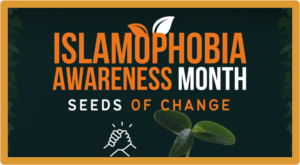Author: Amjad Ali
Islamophobia is a word that has gained limited prominence in recent years, as a result there is still a concerning lack of understanding surrounding it. Defined as prejudice, fear, or hatred toward Islam and Muslims, Islamophobia is not just an individual bias—it is a structural and societal issue that affects the lives of millions globally. Each November, Islamophobia Awareness Month seeks to highlight these challenges, foster understanding, and create a dialogue about how we can combat this form of discrimination. Unfortunately, awareness of Islamophobia, its impact, and even the existence of Islamophobia Awareness Month itself remain limited.
To understand the significance of Islamophobia Awareness Month, we need to examine the roots of Islamophobia itself. Negative perceptions of Islam and Muslims are deeply ingrained in the media, politics, and society. For decades, Islam and Muslims have often been portrayed through the narrow lens of extremism, violence, or “otherness.” This stereotype misrepresents a complex, diverse, and peaceful religion and reinforces harmful biases. These damaging views are perpetuated when the only stories told about Muslims are connected to conflict or terrorism, rather than showcasing the variety of Muslim lives, experiences, and contributions. This lack of positive or balanced representation can lead to a society that harbours baseless fears and prejudice.
In the UK, where around 6% of the population identifies as Muslim, Islamophobia remains prevalent. The 2019 report from the All-Party Parliamentary Group (APPG) on British Muslims emphasised that Islamophobia is rooted not only in personal bias but in systemic exclusion. Discrimination in the workplace, education, and even in the criminal justice system is a reality for many Muslims. Schools, for instance, often report instances where Muslim students feel marginalised or stereotyped because of their beliefs. This is why Islamophobia Awareness Month is so vital in bringing these issues to the forefront and helps break down the stigma and allows people to reflect on how these biases manifest in everyday life.
The aim of Islamophobia Awareness Month https://www.islamophobia-awareness.org/wp-content/uploads/2024/08/IAM-Guide.pdfis to educate, but also to engage. Educational campaigns often focus on dismantling myths about Islam and showing the diversity of the Muslim community. These campaigns strive to present a more accurate and well-rounded image of Islam and Muslims, challenging the stereotypes that fuel Islamophobia. For instance, many non-Muslims remain unaware of the varied cultural traditions and peaceful practices within Islam, as well as the religion’s emphasis on charity, kindness, and community. Learning about these can shift public perception and help people see beyond the narrow portrayals that dominate media.
For Muslims, Islamophobia Awareness Month also serves as a reminder that they are not alone in their experiences and that change is possible. By building partnerships with schools, workplaces, and community groups, this initiative encourages inclusivity and the development of policies that combat prejudice. Workshops, talks, and social media campaigns during the month are designed to raise awareness, but also to empower Muslims to share their stories and advocate for their rights.
To fully eradicate Islamophobia, we need to build a society rooted in empathy and knowledge, where every individual feels valued and respected, regardless of their background or beliefs. Islamophobia Awareness Month plays an essential role in this by highlighting both the struggles and contributions of Muslims and creating a platform for discussion, learning, and change. By supporting these efforts, we can begin to create a world where Islamophobia becomes a relic of the past, and every person, regardless of faith, can live without fear or prejudice.
Also- check out- https://www.islamophobia-awareness.org/resources/
Categories: Blogs

